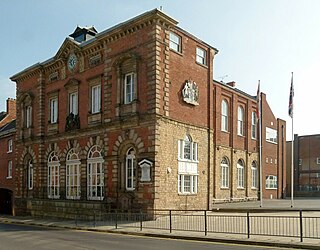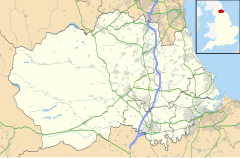
Hetton-le-Hole is a town and civil parish in the City of Sunderland, Tyne and Wear, England. It is in the historic county of Durham. A182 runs through the town, between Houghton-le-Spring and Easington Lane, off the A690 and close to the A1(M).

Gibside is an estate in Tyne and Wear, North East England. It is located in the valley of the River Derwent on the border with County Durham, between Rowlands Gill and Burnopfield. The estate is the surviving part of a Georgian landscaped park, primarily created under the ownership of Sir George Bowes (1701–1760) and designed in large part by Stephen Switzer and William Joyce.

Hylton Castle is a stone castle in the North Hylton area of Sunderland, Tyne and Wear, England. Originally built from wood by the Hilton family shortly after the Norman Conquest in 1066, it was later rebuilt in stone in the late 14th to early 15th century. The castle underwent major changes to its interior and exterior in the 18th century and it remained the principal seat of the Hylton family until the death of the last Baron in 1746. It was then Gothicised but neglected until 1812, when it was revitalised by a new owner. Standing empty again until the 1840s, it was briefly used as a school until it was purchased again in 1862. The site passed to a local coal company in the early 20th century and was taken over by the state in 1950.

Bolton is a small village and former civil parish, now in the parish of Hedgeley, in the county of Northumberland, England. It is situated on the north side of the River Aln, about two miles (3 km) east by north from Whittingham, and 5+1⁄2 miles west from Alnwick. It has a chapel and a small number of residential properties.
The Brandlings of Newcastle were a wealthy family of merchants and land and coal owners in Newcastle upon Tyne and Northumberland.
This is a list of the high sheriffs of County Durham, England.

Whitmore Hall is the home of the Cavenagh-Mainwaring family at Whitmore, Staffordshire. A Grade I listed building, the hall was designated a house of outstanding architectural and historical interest and is a fine example of a small Carolean style manor house.

Duffield Hall is a 17th-century country house situated in the Amber Valley, Derbyshire and the former headquarters of the Derbyshire Building Society. It is a Grade II* listed building.

The baronetcy of Conyers of Horden was created in the Baronetage of England on 14 July 1628 for John Conyers of Horden, County Durham.

Beamish Hall is a mid-18th-century country house, now converted to a hotel, which stands in 24 acres (97,000 m2) of grounds near the town of Stanley, County Durham. It is a Grade II* listed building.
The Shafto family is an alternative surname for the Ffolliot family, who were established in the 14th century at Shafto Crag, Northumberland and adopted the alternative surname of Shafto.

Thornton Hall is a privately owned 16th century manor house at High Coniscliffe, near Darlington, County Durham. It is a Grade I listed building.
Crook Hall, sited near Lanchester, County Durham, some 8 miles (13 km) north west of the city of Durham, was the seat of the Baker family and one of two Roman Catholic seminaries which temporarily replaced the Douai seminary in Douai, France when that college was suppressed soon after the French Revolution. Crook Hall was itself superseded after a few years by Ushaw College.
Thomas Conyers of Elemore Hall, County Durham was an English Tory politician who sat in the English House of Commons between 1695 and 1708 and in the British House of Commons from 1708 to 1727.

Noseley Hall is a privately owned 18th-century country house situated at Noseley, Billesden, Leicestershire. It is a Grade II* listed building.

Rode Hall, a Georgian country house, is the seat of the Wilbraham family, members of the landed gentry in the parish of Odd Rode, Cheshire, England. The estate, with the original timber-framed manor house, was purchased by the Wilbrahams from the ancient Rode family in 1669. The medieval manor house was replaced between 1700 and 1708 by a brick-built seven-bay building; a second building, with five bays, was built in 1752; the two buildings being joined in 1800 to form the present Rode Hall.

Hardwick Hall in Sedgefield, County Durham is a building of historical significance and is a Grade II listed building on the English Heritage Register. A major part of it was built in the late 1700s but it is possible that some of it dates from about 1634. It was the residence for many notable people for two centuries. It is now a hotel which provides accommodation and restaurant services and caters for special events particularly weddings.

The Lyttelton family is a British aristocratic family. Over time, several members of the Lyttelton family were made knights, baronets and peers. Hereditary titles held by the Lyttelton family include the viscountcies of Cobham and Chandos, as well as the Lyttelton barony and Lyttelton baronetcy. Several other members of the family have also risen to prominence, particularly in the field of cricket.

George Baker of Crook Hall, Lanchester and Elemore, county Durham, was a British landowner and Tory politician who sat in the House of Commons from 1713 to 1722.

Worksop Town Hall is a municipal building in Potter Street, Worksop, Nottinghamshire, England. The town hall, which was the headquarters of Worksop Borough Council, is a Grade II listed building. It is used for meetings of Bassetlaw District Council, whose main offices are in an adjoining building.
















